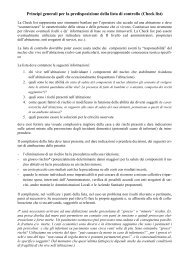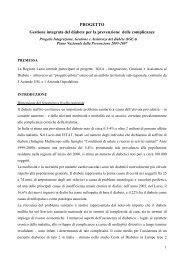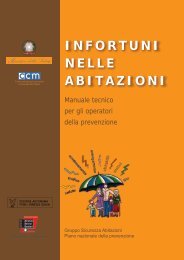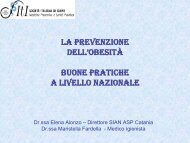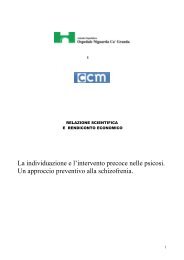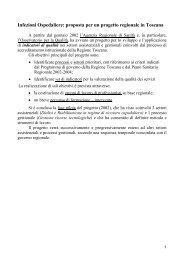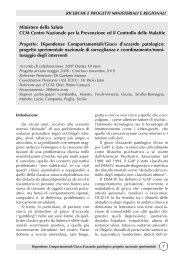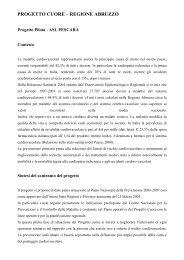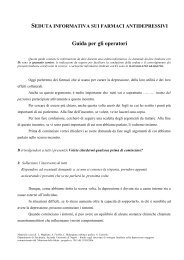Gaining health : analysis of policy development in European ...
Gaining health : analysis of policy development in European ...
Gaining health : analysis of policy development in European ...
Create successful ePaper yourself
Turn your PDF publications into a flip-book with our unique Google optimized e-Paper software.
Chapter 4<br />
194<br />
An attempt was made to streaml<strong>in</strong>e related activities <strong>of</strong><br />
various WHO projects such as CINDI, Healthy Cities,<br />
Health Promot<strong>in</strong>g Schools and Health Promot<strong>in</strong>g Hospitals,<br />
by “network<strong>in</strong>g the networks”, with the <strong>in</strong>tention <strong>of</strong> creat<strong>in</strong>g<br />
a better balance <strong>in</strong> terms <strong>of</strong> <strong>health</strong> promotion, disease<br />
prevention and <strong>health</strong> care actions.<br />
2.1.2. Awareness build<strong>in</strong>g and the consultation process<br />
The process <strong>of</strong> <strong>health</strong> <strong>policy</strong> <strong>development</strong> <strong>in</strong> Lithuania is<br />
led ma<strong>in</strong>ly by experts from academia and research. What<br />
is perhaps notable is that, although there are prom<strong>in</strong>ent,<br />
undisputed leaders <strong>of</strong> this <strong>in</strong>fluential group, it is not an<br />
exclusive club. As far as we can discern, attempts have been<br />
made to <strong>in</strong>volve groups <strong>in</strong> different parts <strong>of</strong> the country <strong>in</strong><br />
the background research, <strong>policy</strong> formulation and monitor<strong>in</strong>g<br />
processes. As seen <strong>in</strong> relation to the <strong>development</strong> <strong>of</strong> the<br />
National Health Concept, the Medical Association also plays<br />
a strong role.<br />
One aspect that perhaps differs from other countries is the<br />
heavy <strong>in</strong>volvement <strong>of</strong> Parliament. This is not simply a question<br />
<strong>of</strong> Parliament pass<strong>in</strong>g legislation or approv<strong>in</strong>g a document<br />
at the end <strong>of</strong> a <strong>policy</strong> formulation process. Very soon<br />
after ga<strong>in</strong><strong>in</strong>g <strong>in</strong>dependence, Parliament devoted a whole day<br />
to discuss<strong>in</strong>g the <strong>health</strong> challenges fac<strong>in</strong>g the country. Those<br />
broad discussions were clearly a part <strong>of</strong> the more general<br />
political process set <strong>in</strong> tra<strong>in</strong> by a country redef<strong>in</strong><strong>in</strong>g its own<br />
national identity.<br />
S<strong>in</strong>ce then, an annual public <strong>health</strong> report (around 100<br />
pages) is prepared by the National Board <strong>of</strong> Health (see<br />
below). In late spr<strong>in</strong>g each year, a summary <strong>of</strong> this report<br />
is presented to Parliament, which allocates 2.5 half hours<br />
to its presentation and discussion. In November each year,<br />
Parliament holds its one-day “Dialogue for <strong>health</strong>”, which<br />
has become a Lithuanian tradition. The public gallery is<br />
packed and the whole discussion broadcast on radio. Twice<br />
a year, therefore, on a regular basis, Parliament discusses<br />
public <strong>health</strong>. All reports are published and widely available,<br />
creat<strong>in</strong>g pressure on the M<strong>in</strong>istry <strong>of</strong> Health regard<strong>in</strong>g the<br />
issues they cover.<br />
There has been cont<strong>in</strong>ued good collaboration between the<br />
Parliamentary Health Committee, the M<strong>in</strong>istry <strong>of</strong> Health<br />
and the academic community. Academics are respected<br />
by all political parties and asked to provide <strong>in</strong>formation on<br />
<strong>health</strong> issues. Their cross-party acceptance is said to be due<br />
partly to the fact that many academics were active <strong>in</strong> the<br />
liberation movement lead<strong>in</strong>g to reforms <strong>in</strong> the <strong>health</strong> sector,<br />
thus ga<strong>in</strong><strong>in</strong>g and reta<strong>in</strong><strong>in</strong>g the respect <strong>of</strong> politicians.<br />
The National Board <strong>of</strong> Health, set up <strong>in</strong> 1998, plays a strong<br />
role <strong>in</strong> awareness build<strong>in</strong>g and its sessions are open to the<br />
public. One third <strong>of</strong> its 15 members are experts <strong>in</strong> public<br />
<strong>health</strong>, one third are nom<strong>in</strong>ated by the Association <strong>of</strong> Municipalities<br />
and one third represent NGOs, although there<br />
is apparently some concern among the NGOs as to the<br />
weight given to their op<strong>in</strong>ion. The President is not appo<strong>in</strong>ted<br />
by the Government but elected by secret vote among<br />
the members <strong>of</strong> the Board. Employees <strong>of</strong> the Board’s secretariat<br />
are civil servants.<br />
The Board is <strong>in</strong>dependent <strong>of</strong> the M<strong>in</strong>istry <strong>of</strong> Health and<br />
reports each year directly to Parliament. Under the guidance<br />
<strong>of</strong> its first President, Pr<strong>of</strong>essor Vilius Grabauskas, this<br />
report has taken a two-part form, the first part be<strong>in</strong>g a<br />
standard general report <strong>in</strong>clud<strong>in</strong>g <strong>in</strong>ternational comparisons<br />
and the second part deal<strong>in</strong>g with different topical issues.<br />
In the first three years, for example, special issues <strong>in</strong>cluded<br />
the social determ<strong>in</strong>ants <strong>of</strong> <strong>health</strong>, the <strong>health</strong> <strong>of</strong> children and<br />
young people, and harmoniz<strong>in</strong>g the <strong>health</strong> system with EU<br />
requirements.<br />
Partly through the work <strong>of</strong> this <strong>in</strong>dependent Board, strong<br />
public pressure can be brought on the M<strong>in</strong>istry <strong>of</strong> Health.<br />
For example, ow<strong>in</strong>g to such pressure the M<strong>in</strong>istry agreed<br />
to exam<strong>in</strong>e the possibility <strong>of</strong> fund<strong>in</strong>g <strong>health</strong> promotion<br />
services , such as certa<strong>in</strong> screen<strong>in</strong>g processes, through the<br />
Case studies: <strong>policy</strong> <strong>development</strong> <strong>in</strong> countries for tackl<strong>in</strong>g noncommunicable diseases



